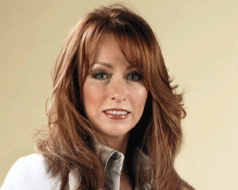
Online master’s degree helps nurse start her own business
Meet a registered nurse who used an online master's degree in business as her way to transition her career in health care towards her dream of owning her own nutrition bar business.
Alicia Sable-Hunt was a registered nurse who dreamed of creating a delicious nutrition bar that met the specific dietary needs of cancer patients. She had only one problem: her bachelor’s degree in nursing hadn’t included any business classes. She decided to earn an MBA in marketing online before moving into the business world. Today, she’s the president and founder of Sable’s Foods and Edwards-Hunt Group, a medical consulting group.
What inspired you to head back to school?
I work in health care, where a graduate degree is necessary for career advancement, especially in the clinical research sub-specialty. Second, I had an idea — Sable’s Foods — but didn’t know how to bring it to fruition. I needed a business background to move forward with my idea. My inner drive to learn and experience more combined with an entrepreneurial spirit drove me to continue my education.
Why did you choose an online program specifically?
My work schedule and personality was best suited for a non-traditional program. I was working long hours and traveling extensively for work. I could not attend a traditional program and complete my degree in a timely manner. In addition, my personality is driven towards alternative solutions to every challenge. I like to try new and different ways of achieving an end result. I am a risk taker. I had a positive experience with online education, so the choice was easy for me.
What were you surprised by while earning an MBA in marketing online?
I find students are more interactive in an online environment. The fear of speaking up in a public forum is minimized, and therefore I received a great deal of feedback on my ideas. The fact that I had a sounding board, one without judgment, was very useful. I found this to be an important component for a degree that requires a level of creativity.
How did your interactions with professors and other students happen online?
All of my interactions with the professors and students were online. In fact, I don’t remember speaking directly with anyone other than my enrollment counselor. While this may sound impersonal to some, the quality and frequency of the communication was high. I never felt alone or without support/resources.
What did a typical day look like while you were earning your MBA?
If I was home, I would work all day and complete my studies in the evening. When I was traveling, which was most of the time; I would complete my homework on the airplane, check into class from a wi-fi spot on the road, and complete the bulk of my studies late at night or before sunrise.
Give an example of a challenge you overcame while completing your thesis project.
My thesis was a marketing plan for Sable’s Foods. I was actively trying to create the product while I was writing my thesis project. It was difficult to think strategic (thesis) while also being tactical (baking the bars). The transition between the two thought processes was difficult — consider the expression “seeing the forest through the trees.” On a daily basis, I had to spend time in the kitchen creating the product then spend my evenings building a strategic marketing plan. I suspect, it is a challenge — I should say a skill set — every small-businessperson must learn.
What was your experience of starting two businesses after earning your online degree?
To sum it up: exhilarating, exhausting, lonely, and the best and worst time of my life. To finally have the knowledge to turn my ideas into businesses was, and continues to be, exhilarating! The time and commitment required to do both at the same time was exhausting and lonely. I spent 18-20 hours per day, in an office (Edwards-Hunt Group) or kitchen (Sable’s Foods), building my businesses. There was no time for a vacation or holiday, very little time for friends and family, all of which leads to a very lonely existence. But the end result is two businesses that I am proud of. The sacrifice was worth it.
What advice would you give those considering an online degree?
It is critically important to perform a realistic self-assessment. An individual needs to know what motivates them in a scholastic environment (e.g. do they need the structure of attending a moderator-led class in a physical location three times per week), how they absorb information (e.g. visual vs. reading vs. lecture) and their commitment level (e.g. include the time and cost of commuting to a class into the decision).
